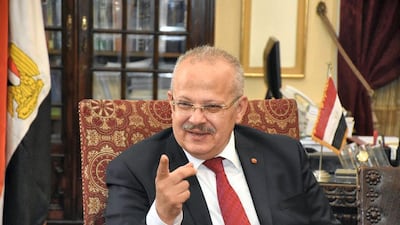The appointment of a professor of Islamic studies and philosophy as president of Cairo University may have come as a surprise to some, but Mohamed Osman El Khosht has a vision of Islam that embraces science and technology while according space to Egypt's Coptic Christian minority.
And in that vision, he is at one with president Abdel Fattah El Sisi’s call for a “new religious discourse” and the Egypt Vision 2030 plan to propel the country towards a knowledge-based economy.
The professor is, for example, a constant critic of rote learning and academic authoritarianism, both of which still dominate in Egyptian education at all levels.
“A closed education system causes terrorism because it depends on memorisation without comprehension,” he said, referring to primary schools where students memorise passages from the Quran with little analysis or discussion.
Professor El Khosht, 53, has written 57 books and numerous articles, establishing him as a leading Muslim scholar who connects his faith to western thought — an approach that began in his adolescence. “I first read Bertrand Russell when I was 15,” he said. This precocity in a teenager drew the attention of elders at his local mosque in the middle-class Dokki neighbourhood of Cairo.
“One day when I was 16, the imam was sick so they asked if anyone was ready and felt able to do the Friday Khutba [sermon]. The older people were afraid to take on the responsibility, but I was the headstrong teenager.”
He has won admiration for blending the Muslim faith and humanistic philosophy and bravely following an academic path that has clear political implications at Egypt’s flagship higher education institution.
“There is a strong connection between El Khosht’s scholarly work on the philosophy of religions and President Sisi’s call for a new religious discourse,” said Mahmoud Al Said, vice dean for education and student affairs. “It’s about formation of a religious approach distinctly different from those perpetuated by the closed minds of some clergy who don’t comprehend the spaciousness of either the world or of religion.”
But this quest for innovation does not mean Egypt's state-funded universities are about to become awash with partisan politics. After two students died in clashes between Egyptian police and Muslim Brotherhood supporters in January 2014, Cairo University officials declared the campus a “no politics zone”.
To reinforce the continuity of this policy, within days of assuming his post in August, Mr El Khosht suspended four professors in the chemistry department after they returned from a Muslim Brotherhood conference in Germany.
“We facilitate workshops for students and host academic conferences on regional and international issues,” he said. “But no political parties can actively work on campus.”
He wants Cairo University to be an incubator for entrepreneurial start-ups, not a political hothouse for student sit-ins.
In October, the Faculty of Economics and Political Science launched an entrepreneurship hub aimed at students and alumni to provide seed money and professional coaching for start-ups in manufacturing, tourism, energy and agribusiness.
"My vision of Cairo University is that it becomes a third-generation university focused on grooming graduate entrepreneurs," Mr El Khosht said. "We need to train students to use their own ability to solve problems and take initiative. It's the only way to cultivate the kind of leaders needed to create the small and micro enterprises that will drive economic growth."
One priority is reforming the examination system. “If the exam will test the ability to understand, the student will understand. If the exam tests the ability to analyse and compare, the student will train himself on analysis and comparison. If the exam tests the ability to think critically, the student will study critical thinking."
Bullying became a hot topic on campus after a third-year arts student died of heart failure in January after being forced by a professor to leave a final exam because her mobile phone rang.
As the university’s former vice president for education and student affairs, Mr El Khosht helped his predecessor implement programmes against sexual harassment, the first at an Egyptian public university. Now as president, he says he is moving from protecting women to advancing them. His own two daughters, both of college age, make their own decisions about how to dress and what to study, he says.
Statistics which show unemployment at a startling 56 per cent among Egyptian female college graduates illustrates the urgency of his commitment to gender-neutral evaluation, Mr El Khosht said.
“We need to not only confront the idea of harassment but change the Middle Eastern male perception of women. Male academics must understand that competition in teaching and research is not related to masculinity or femininity but to efficiency and ability to perform. Promotions and awards have to be based solely on the standard of the work.”
For the new president, Cairo University's future depends not only on meeting international academic and technology standards, but on truly embracing diversity and a commitment to becoming a global institution. The first practical measure has been to admit more foreign students. In fact, the 3,000 international students accepted this year is double the 2016 number.
“Of course, this adds to the income of the university in a very strong way, but more vital is contact with the wider world that happens not just through an interdisciplinary syllabus, but through interpersonal relationships transforming all of our Egyptian students into international scholars as well.”

